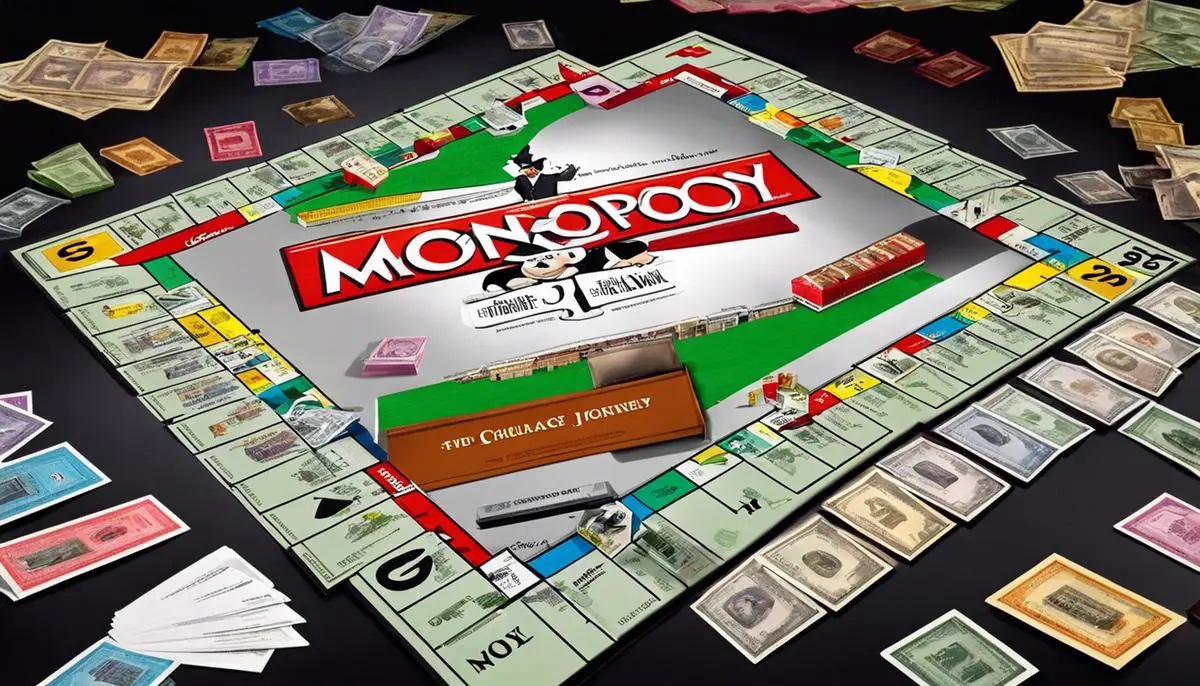Monopoly, an iconic board game, that has spanned generations, managed to maintain its popularity and charm throughout the years. It’s a timeless classic that still holds an indispensable spot in our game nights and social gatherings. This essay embarks on a journey tracing the evolution of Monopoly, hailing from the streets of Atlantic City to the screens of our devices. Venture through the elements that make the original Monopoly game iconic, the various thematic special editions that have captured our fascination, the simplicity of the junior version intended for the young minds, and the digital transformation that redefined the gaming experience.
history of the monopoly game
“The Grand Journey: Evolution of Monopoly Over the Decades”
Monopoly, a household name and a classic all around the world. This iconic board game loved by all ages didn’t just appear out of thin air; it has a rich history and has evolved dramatically over the decades. Let’s take a stroll through memory lane and witness the impressive evolution of monopoly.
Journey back to 1903 to meet the brain behind this remarkable game, Elizabeth Magie. Monopoly was first introduced under the name ‘The Landlord’s Game’, aiming to demonstrate the drawbacks of land concentration. Eventually, Charles Darrow, in 1933, transformed the game into what we now know as Monopoly. The game was a hit, and soon enough, Parker Brothers company stepped in, buying the rights to the game in 1935.
As time passed, the 40s and 50s witnessed minor changes, upholding the spirit of the original concept. The 60 versions showcased an assigned piece to each player, from a top hat to a thimble. Neat, right?
The 70s and 80s brought drastic changes. Parker Brothers rolled out themed versions. The original Atlantic City-based property names transitioned to cities, pop culture elements, and even universities. Any guesses on how many versions exist today? A staggering 1,100+ versions, with themes ranging from Star Wars to Pokemon. Talk about evolution!
Jump into the 90s, and we can’t forget the re-introduction of the classic version of monopoly. Playing a nostalgia card, Parker Brothers re-released a replica of the original 1935 version. It’s heartwarming how, even amid the digital age, they kept the classic version alive.
Entering the 21st century, Monopoly took a technological leap by introducing electronic banking in 2006. Say goodbye to paper money, and hello to credit cards! A vital shift was made by showcasing a modern economy where cash is less prominent.
Also around this time, you’d find Monopoly games directed towards younger kids, like Monopoly Junior; because it’s never too early to start dealing in real estate!
Fast forward to the present day, and the evolution continues with Monopoly making its move into the digital world. In 2017, Monopoly released an online version, available on major gaming platforms. How convenient is that?
The evolution of Monopoly reflects changing times, adapting to new trends while still maintaining its core. It’s fascinating to think that the game that started as a commentary on land ownership has turned into a beloved classic with universal appeal – a game that continues to evolve and delight generations of players. In the end, that’s Monopoly for you – a game truly of the people, by the people, and for the people.
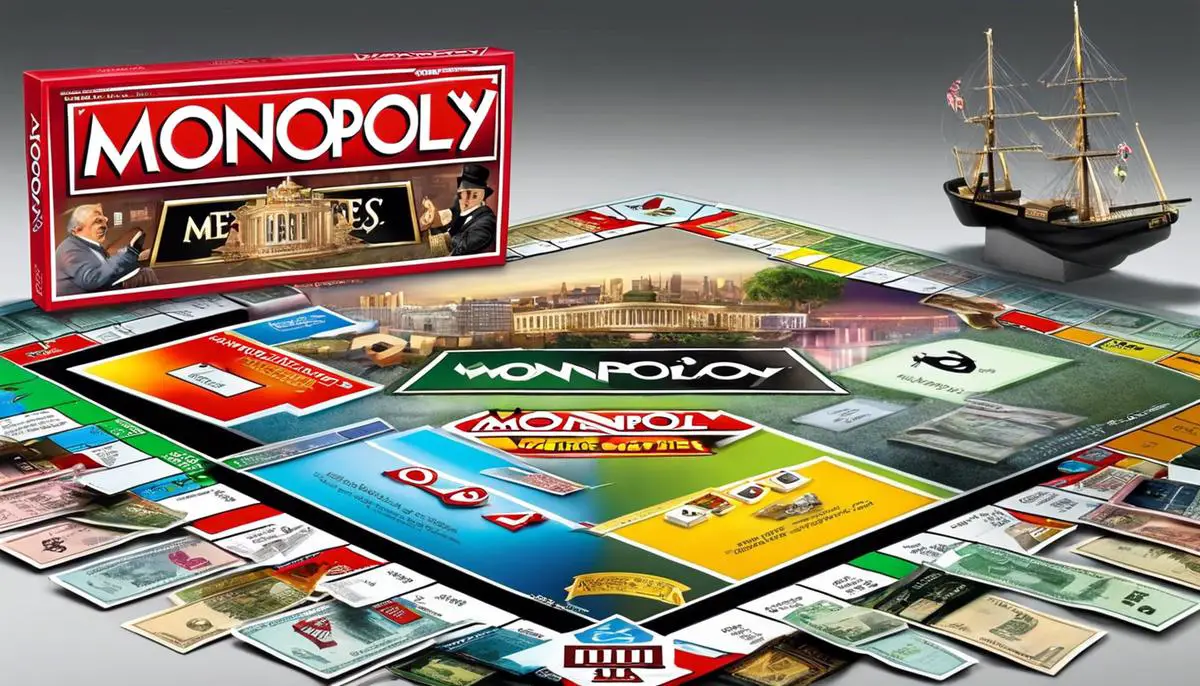
classic monopoly game
No one can deny the timeless appeal of the classic Monopoly game. It’s been doing the rounds at family gatherings and game nights for generations. The simple yet strategic nature of this board game is one of its main strengths that engrosses players of all ages. But have you ever wondered what exactly made this property purchasing board game a family favorite?
One of the significant factors of Monopoly’s popularity is its easy to grasp rules. The elusive charm of Monopoly lies in the simplicity of its core concept – buy, rent, and build to accumulate the greatest wealth possible and ultimately bankrupt your rivals. It’s an undertaking that the whole family can appreciate and engage in, irrespective of age or gaming prowess.
Moreover, the unique player pieces are not merely playing tokens; they have become an integral part of the game. Ranging from the beloved thimble and top hat to the loyal Scottie dog, these game pieces have fostered a sense of identity and ownership among players, further deepening their engagement with the game. Even the smallest aspects, like choosing a game piece, become a unique part of the Monopoly experience, emphasizing personalization and strategic selection.
Another aspect to consider is the thrill of strategy and negotiation the game delivers. Monopoly isn’t solely reliant on the roll of the dice; it encourages strategic thinking, negotiation skills, and calculated risks, making every game more than a game of mere chance. To win, players must think ahead, plan their tactics and bargain shrewdly, offering a thrilling mixture of luck, skill, and strategy. This paves the way for a dynamic and unpredictable gaming experience, ensuring no two Monopoly games are ever quite the same.
Additionally, Monopoly’s cultural significance cannot be understated. With the game showing up in movies, TV shows, and even in pop cultures across the globe, its relevance in history is crystal clear. Such ubiquitous visibility further cements its throne in the world of family-friendly board games.
The tactile satisfaction offered by Monopoly also contributes to its broad appeal: the suspenseful clicking of the dice, the gratifying feeling of crisp game money, the utilitarian charm of the miniature houses and hotels all combine to create an appealing physical experience that modern video games cannot replicate.
Lastly, the universality of Monopoly’s theme – property, wealth, and prosperity is crucial to its widespread acceptance. It allows players to experience the fantasy of financial success and worldwide property ownership, giving them a taste of triumph and power, albeit in the imaginary scope of a board game.
In conclusion, Monopoly’s enduring popularity as a family favorite emerges from a unique amalgamation of simple yet engaging gameplay, strategic depth, cultural significance, and the universal appeal of its theme. Interesting and demanding enough to stir the competitive spirit, yet straightforward and fair enough to foster a happy family mood, Monopoly has carved a niche for itself in the world of table-top games that few others can vie for. It’s not just a game; it’s a tradition that continues to bring generations together, one roll of dice at a time.
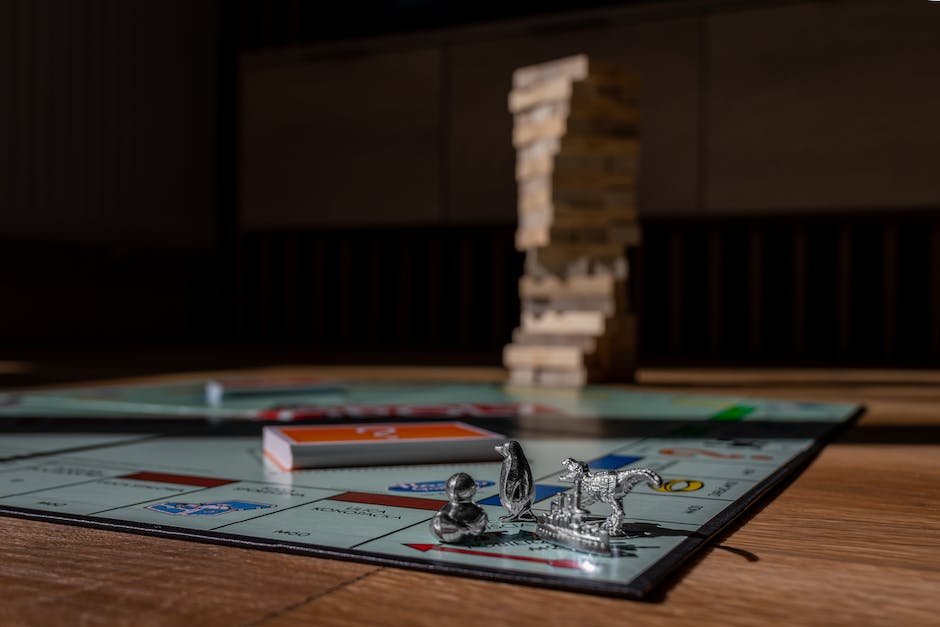
monopoly special editions
Now, let’s dive into the real nitty-gritty: the appeal of special edition Monopoly sets. With the game’s evolution, the introduction of themed versions, ranging from pop culture references to major cities and more, have added a dash of fresh, vibrant flavor to the Monopoly universe.
These special editions take the traditional Monopoly game and revamp the player pieces, the properties, and even the Chance and Community Chest cards to reflect the theme of the edition. The joy of maneuvering a tiny, detailed figure – whether it’s Harry Potter’s wand, a Star Wars’ X-wing Starfighter, or a miniature Eiffel Tower across iconic destinations is an unparalleled experience.
The tweaking of property names to match the theme of the edition? Ingenious. Buying, selling, and trading familiar locations heightens the game’s intrinsic charm. Imagine the sheer delight in purchasing Hogwarts Castle in the Harry Potter edition or owning the Death Star in the Star Wars edition!
Also not to be overlooked is the thrill of themed chance and community chest cards. Whether you’re drawing an ‘Adventure Card‘ in the Disney version or a ‘Transfiguration Card‘ in the Hogwarts edition, these customizations keep players eagerly on their toes, adding an appealing unpredictability to the traditional game flow.
Moreover, exclusive rules or features tailored to the theme can offer fascinating strategic alterations, making each board game a distinct tactical experience. For instance, in Monopoly: Fortnite Edition, the traditional Monopoly money is replaced by Health Points, keeping the game more in line with Fortnite’s battle royale style. In the Game of Thrones Edition, the introduction of ‘Valar Morghulis‘ cards can switch up the power dynamics halfway through the game.
The cultural significance plays a role too, as fans of a particular series, franchise, or city can express their admiration through a themed Monopoly set. Ever dreamt of being a lord in Westeros, a wizard in Hogwarts, or a real estate mogul on the Las Vegas strip? These special versions of the game offer a small taste of that fantasy.
Finally, the tactile satisfaction and appeal associated with these special editions cannot be overstated. The detailed game components such as tokens, houses, hotels, and even currency are a treat for both the eyes and hands. Coupled with a beautifully designed game board that brings the theme to life, these editions offer an immersive game playing experience.
In essence, special edition Monopoly sets take a timeless classic and reinvent it through the lens of beloved franchises, iconic locations, and innovative gameplay alterations. All in all, they have truly redefined the way we experience the thrilling world of Monopoly, one uniquely themed token move at a time.
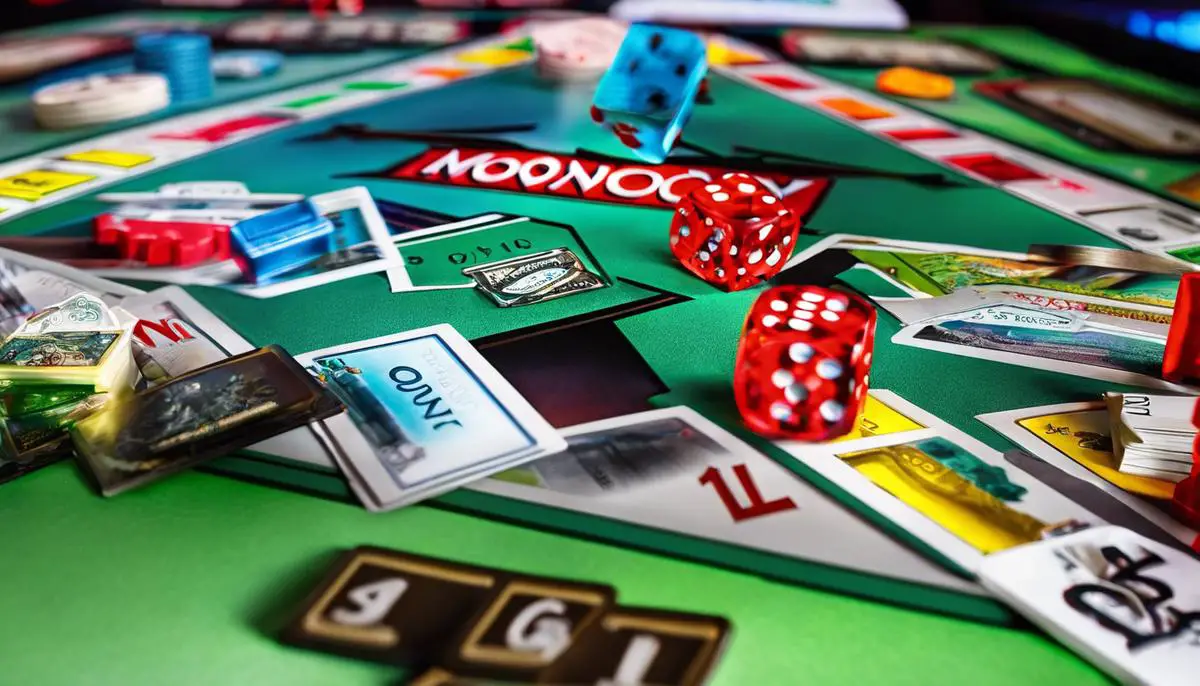
monopoly junior versions
Right, let’s dive into why Monopoly Junior versions make an excellent addition to the gaming repertoire for the younger crowd. Simplicity is the keyword. Compared to the traditional adult version, Monopoly Junior’s rules are simplified – less business jargon, reducing the duration of play while uncompromising the thrill of strategy and competition. Simply put, it’s easy for children to pick up and learn, yet emulates the thrill and the feel of the traditional version. An ideal segue from child’s play to more sophisticated board games.
Onto the highlight of the Junior versions: the player pieces. Steering clear from the classic tokens – the top hat, the battleship, or the ever charming Scottie dog – the Junior versions present tokens uniquely modelled based on the game’s theme. It adds an extra ripple of excitement for the kids, fueling their imagination as these custom elements roam around the familiar manifold of colored properties.
Integral to Monopoly’s charm, irrespective of generations, is the flavor of strategy and negotiation. Monopoly Junior versions successfully distill this essence, delivering it suitably for young minds. Children can practice negotiation skills and strategic thinking in an environment meant for them, while still experiencing miniature adrenaline surges during a well-played move or profitable negotiation.
As we all agree, Monopoly isn’t just a game – it’s a cultural phenomenon. Its appeal draws from its relatability to real-life financial systems and real estate transactions. The Junior versions manage to portray a simplified mimicry of these systems, thus imparting to youngsters, albeit subtly, an understanding of real-world economics.
Monopoly Junior versions also provide a nostalgic tactile satisfaction that digital games fail to deliver. The joy of physically moving the tokens around the board, trading properties, or stacking currency brings a sense of gratification to the young players that no number of mouse clicks can replicate. It ensures the old-world charm of board games is preserved while being appropriately interactive and engaging for the young minds.
Lastly, Monopoly Junior’s charm is in its adaptability and the universality of its theme. Different variants appeal to different interests – there’s everything from Disney princesses and superheroes to dinosaurs and animals. Each variant offers familiarity, enhancing the game’s appeal and making it not just a game but an experience. The shared themes also help strengthen children’s understanding of the game as they navigate through familiar territories and characters.
Altogether, though smaller and simpler, Monopoly Junior versions don’t fall short of the excitement and engagement that the traditional version has been presenting for decades. They successfully condense the thrill and spirit of Monopoly while crafting a platform for a younger crowd to learn and practice their strategic skills. It’s safe to say that Monopoly Junior versions have made a noticeable mark in nurturing young minds with the joy of board games.
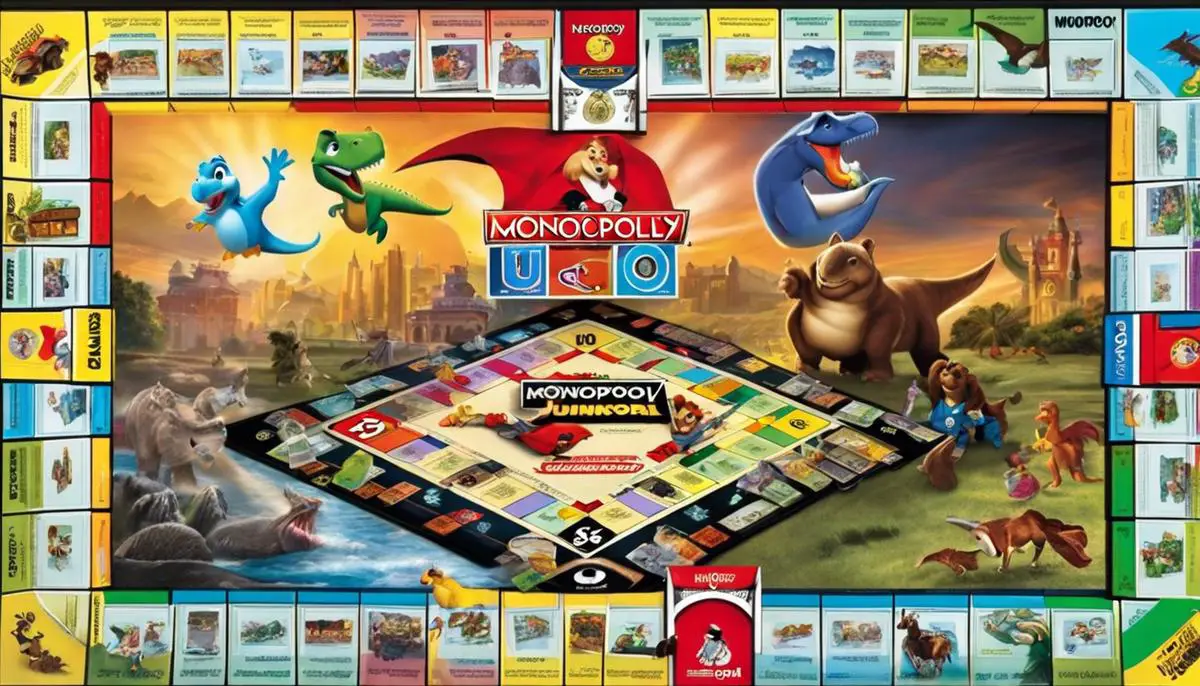
modern digital monopoly versions
Now, let’s further dive into this digital revolution to understand its deeper impact on the classic Monopoly.
Digital versions of Monopoly have transformed the game experience by offering countless advantages to players. One of the significant changes is the speed of play. These digital versions have computerized banking and automatic set-up, both of which significantly reduce game preparation time and run-throughs. The quick transaction times in e-banking make the game faster, leaving no room for human error and ‘cheating’ – indeed, a peculiar characteristic of the classic version embraced by some in a good spirit.
Another feature is the capacity for online multiplayer games. Yes, players do not have to be in the same physical space anymore. This has taken the board game from the living rooms and onto various digital platforms, which means, time and space are no longer constraints. You can play Monopoly on a computer, on a Smartphone, even gaming consoles, with friends, family, or strangers from across the globe at any time of day or night. The game connects people remotely, making it a virtual social activity.
Introducing AI opponents is another noteworthy aspect. You can play solo in digital versions, combating AI of varying difficulty levels. This feature didn’t just provide single players the ability to enjoy the game, but it also offered players opportunity to improve their strategies and understand the depth of the game in detail.
These modern digital versions have also taken the themed experience to the next level. While the physical versions were restricted due to cost and logistical elements, digital versions paved the way for an endless array of themes. From exclusive city editions, movie franchises, to fantasy worlds – the digital Monopoly is only limited by imagination.
In the end, everything boils down to accessibility. The digital versions of Monopoly have made the game incredibly accessible to everyone. Now, anyone with a digital device can download the Monopoly app or play it online with no need to buy or store a physical board game. This revolution is a perfect blend of tradition and modernity where the essence of the game remains intact while embracing the potentials of the digital age. All said and done, Monopoly’s journey from the board to the screen has brought in a new wave of enthusiasts, and the game is set to entertain for years to come.
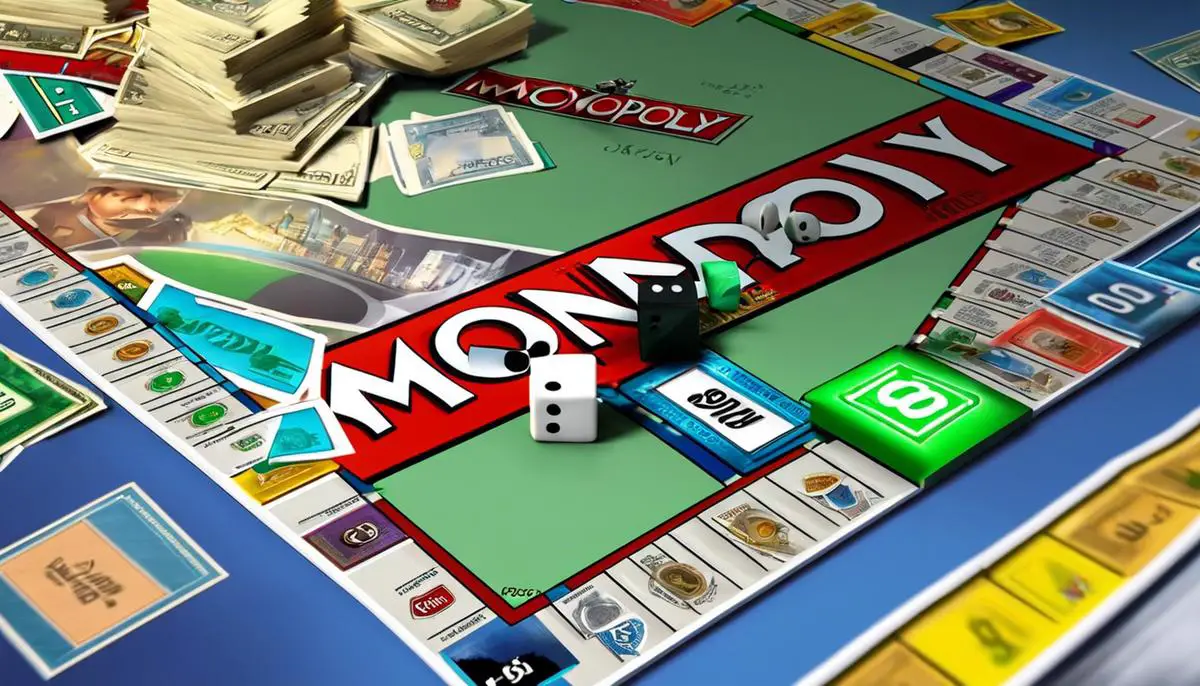
Over the years, Monopoly has emerged as more than a board game; it’s a cultural symbol, learner of fundamental economics, and a conduit for family fun. As the curtains draw on our exploration of Monopoly, it’s evident that its ability to adapt and evolve, be it through charming special editions, simplified junior variants or cutting-edge digital versions, underpins its enduring appeal and relevance. Even in an era of high-definition video games, Monopoly is a reminder of the joys of simpler times while still embracing the future. May the dice keep rolling, and may every ‘Go’ you cross fill your pockets!
